Demystifying Torrents: A Beginner’s Guide to P2P File Sharing
Have you heard of torrents but don’t know what they are or how they work? Don’t worry because you’re not alone. Torrenting is a widely used method of sharing large files online, but it may seem intimidating to beginners. Yet, it’s relatively easy to use once you learn what a torrent is.
You can download most torrenting programs like uTorrent for free. Even better, despite a slow internet connection, it lets you get copies of files and documents. However, you should choose what you download carefully, or you may risk your computer to malware and viruses. Fortunately, this article will provide all you need to get started!
In this newbie guide, I will explain everything you need about torrents. I will cover the basics of what they are and how they work. Moreover, I will cover the benefits and risks of using them for file sharing. I will also demystify common misconceptions about torrenting, such as the popular notion that it’s illegal.
What is a torrent?
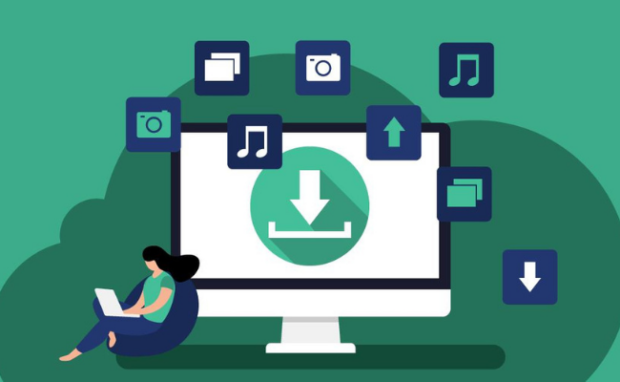
Photo Credit: pensacolavoice.com
Torrenting is the method of uploading or downloading components of a torrent file from several peers or computers. The latter are people who download and share the file with fellow users.
What makes it different from downloading from a central server? This method does not rely on how fast a server is. Instead, it splits a large file into more manageable chunks to transmit to and from multiple computers.
The more peers share or “seed” a file, the faster download speeds become. As a result, torrenting means downloading from numerous computers instead of a single centralized server.
Your torrent program will select the best peers to download your file from, optimizing your download experience. Also, the original sharer may stop once others seed the file.
In contrast, a single server sharing a file would quickly exhaust its bandwidth. Downloads would slow as more people download it, eventually stopping the process for those with slow internet connections. Also, downloads will stop if that server breaks.
You may also like: Two Of The Oldest Active Torrents Are Ubisoft Games
People share their files by providing one of two things: the .TORRENT file or the torrent’s hash. The latter is otherwise known as the magnet link.
They are instructions your downloader uses to get specific data. Also, You may find both on torrent indexes or torrent-sharing websites. Alternatively, you may send and receive them via text, email, and other media.
What are some important torrenting terms?
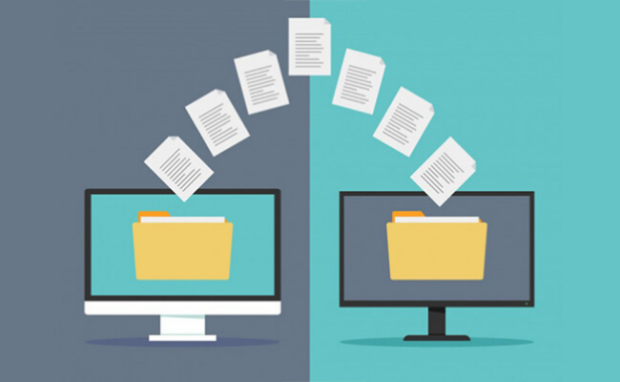
Photo Credit: technadu.com
- Seed: It is another term for sharing a torrent, so the seed count is the number of people sharing a file. Consequently, zero means nobody can download it.
- Leech: These are people who download more than they upload. Also, they do not share files after downloading them.
- Swarm: A group of people downloading and sharing the same torrent.
- Tracker: A server monitoring connected users, helping them find each other.
- Client: The program or web service used by a magnet link or TORRENT file to understand how to download or upload files.
Are torrents legal?
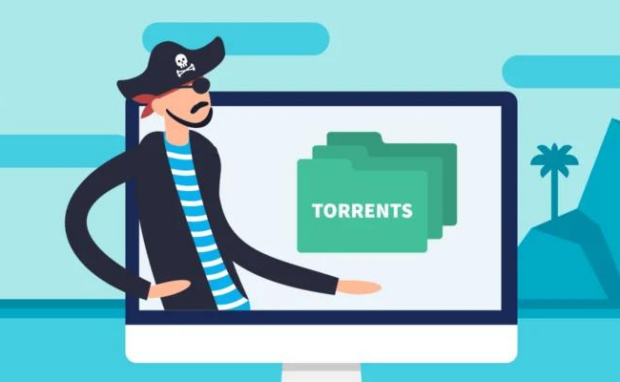
Photo Credit: vpnoverview.com
If you’ve heard of this download method before, you may know them as an illegal method of downloading media for free. Contrary to popular belief, torrenting is legal in most countries if you do not share or download copyrighted material.
The law will not come if you share or download material under your name. Note that this article does not condone or promote pirating or downloading files and programs illegally. Here are the possible penalties you may incur for downloading prohibited content:
- Digital Millennium Copyright Act (DMCA): It forbids creating and distributing copyrighted materials. Also, it penalizes illegal downloaders with $750 per file and fines uploaders up to $250,000. The DMCA requires internet service providers (ISPs) and site owners who detect restricted files to remove them immediately.
- No Electronic Theft (NET) Act: It is a 1997 act that curbs online piracy and fines offenders a maximum of $250,000 and three years in prison.
- Computer Fraud and Abuse Act (CFAA): It became part of the Identity Theft Enforcement and Restitution Act in 1986. The CFAA penalizes users who receive files illegally with a minimum prison sentence of 10 years to life.
You may also like: The Ultimate Guide To ChatGPT
What are the legal ways to torrent?
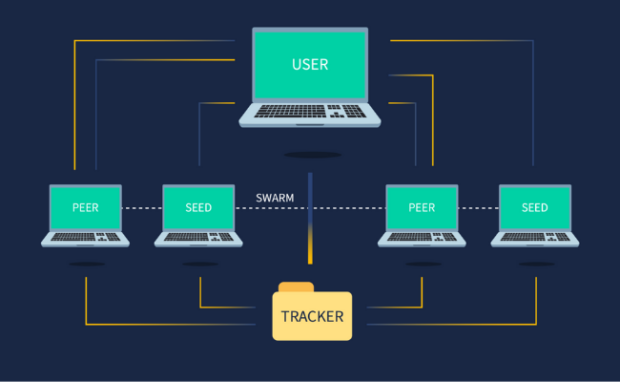
Photo Credit: vpnguru.com
On the other hand, here are how you may legally torrent files and programs. Again, these depend on your country’s laws. Compare the following methods with your local restrictions to confirm they’re fine:
- Faster automatic file syncing: Torrent clients have automated syncing features that enable paying users to share the latest file copies with all connected users. They update every file component automatically each time a file gets updated. As a result, every user has the latest version.
- Updating and downloading games: Nowadays, the most prominent gaming companies use torrent clients to provide game access. Buying from them means torrenting them.
- Social media file transfers: Twitter and Facebook torrent to enable millions of users to access their platforms simultaneously, enhancing user experience.
- Site archiving: Websites like the Wayback Machine torrent files to preserve their huge database of outdated content.
- Public file sharing: Believe it or not, governments like that of the United Kingdom torrent files with their constituents. Consequently, anyone may view them online.
What are the most popular torrent programs?
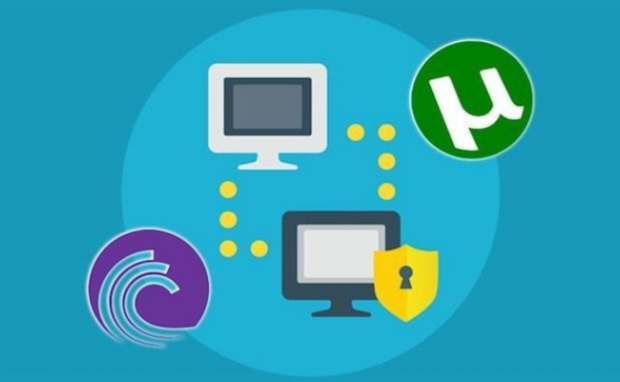
Photo Credit: anonymster.com
BitTorrent and uTorrent are two of the most widely-used programs. You may download them for free, but they offer paid versions for additional features.
Napster was one of the first P2P sharing platforms that broke the mainstream. It launched on June 1, 1999, enabling everyone to download music for free for the first time.
However, it eventually faced multiple lawsuits from various celebrities and organizations. As a result, this download method gained a negative stigma as an illegal downloading method.
You may also like: How To Download Apps On Amazon Fire TV Stick
Later, alternatives like Limewire tried to take its place. These platforms posed significant risks to people back then and now. You could break your computer with malware and viruses if you aren’t careful.
Remember that these downloaders only link you to people sharing files and programs. Use magnet links and TORRENT files from reputable sources only.
Conclusion
In conclusion, a torrent is a file-sharing protocol that lets people download files and programs from others worldwide. Even better, most of the torrent clients are free!
Torrenting can be easy and budget-friendly access to information and media, but you should be mindful of the legal and security risks. Follow your country’s laws and download from legitimate sources to safely enjoy downloading.
Hopefully, this article has helped you understand what a torrent is and how it works. For more digital tips and trends, be sure to follow Inquirer Tech. Stay safe and happy torrenting!
Frequently asked questions about torrenting
How does a torrent work?
When you download a torrent file, your computer connects to a network of other computers, called a “swarm,” that also downloads or uploads the same file. Each computer in the swarm shares small pieces of the file with the others, allowing everyone to download the file faster.
What software do I need to use torrents?
To download torrents, you’ll need a client, such as uTorrent or BitTorrent, which manages the file’s download and upload. Also, you may find them on various websites, but you should choose reputable sources. Otherwise, you may receive problematic software or illegal content.
What are the risks of using torrents?
Download clients only enable you to download content from other people. If you choose poorly, you might download copyrighted content, viruses, and malware. Worse, hackers and law enforcement agencies may target you. That is why you should avoid using sketchy websites and head to reputable ones instead.